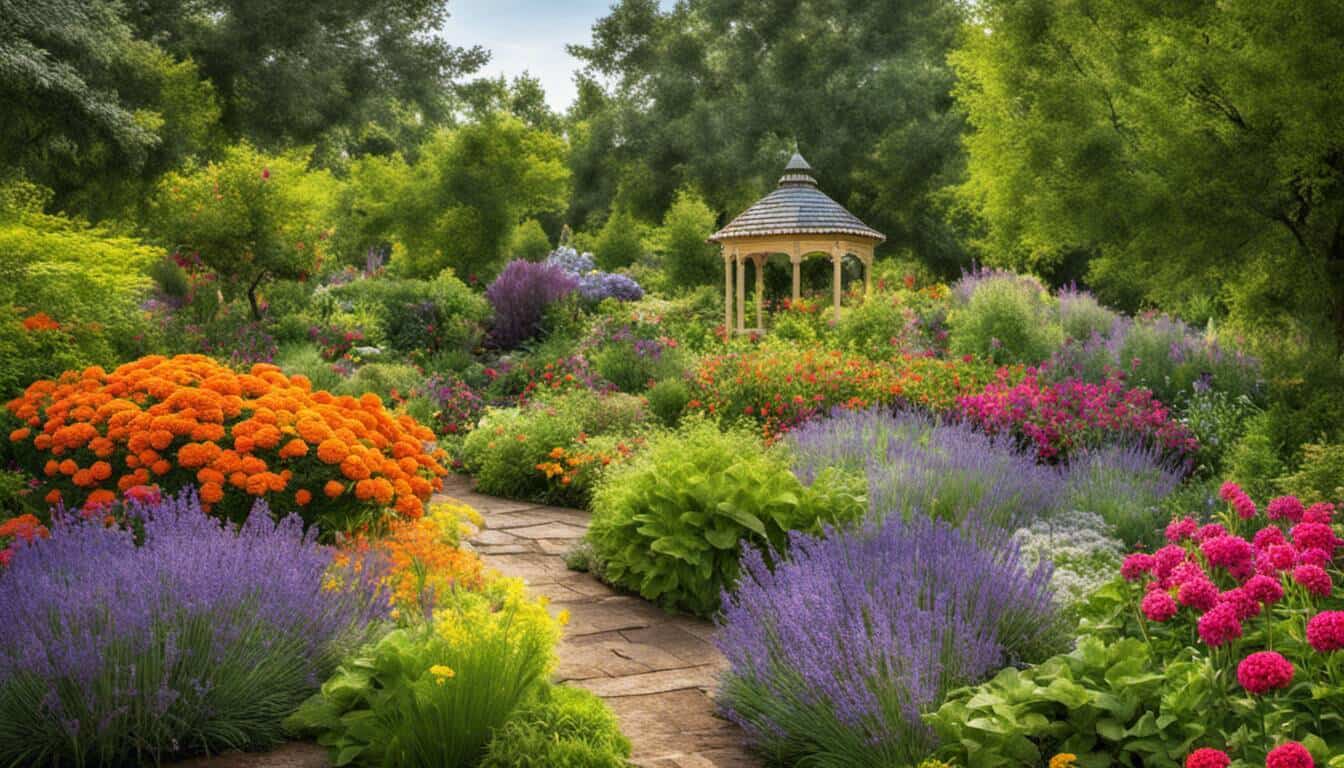In my hometown, summers bring high humidity levels, which unfortunately also means an influx of mosquitoes and midges. They’re a real nuisance, especially when all I want to do after a long day is enjoy a cold beer and unwind. But their relentless biting interrupts even the briefest moments of relaxation. Fed up with this nightly battle, I did some digging and discovered 10 plants that naturally repel these pesky bugs. Harnessing nature’s own DIY pest control method, these plants are not only great for keeping mosquitoes at bay but also add charm to your outdoor space. Dive into this earth-friendly solution and learn how your garden can become a stylish fortress against these pesky invaders.
There are several plants that can be used to naturally repel mosquitoes, including Lavender, Marigold, Citronella Grass, Catmint, Rosemary, Basil, Scented Geranium, Bee Balm (Monarda), Mint, Floss Flower (Ageratum), Sage and Allium bulbs. These plants contain essential oils or fragrances that are known to deter mosquitoes.

“In the quest to curate a mosquito-repelling garden, it is vital to understand that not all plants are created equal. I always recommend Lemongrass, Catnip, and Marigold as the top trio, due to their strong and distinct smells which are reliable deterrents to mosquitoes. However, their placement, growing conditions, and your climate will also play a large role in their effectiveness.”
Willa Pendleton, Horticultural Expert
Identifying Mosquito Repellent Plants
When it comes to combating mosquitoes naturally, your garden can be a valuable ally. By incorporating mosquito repellent plants into your landscape, you can create a pleasant outdoor environment free from these pesky insects. So, let’s explore how to identify these plants and bring bug control into your garden.
One of the most popular plants known for its mosquito-repellent properties is lavender. Not only is lavender visually appealing with its vibrant purple blooms, but it also possesses essential oils that mosquitoes find unpleasant. Its fragrance repels not only mosquitoes but also other common pests, making it a wonderful addition to any garden or patio.
Picture yourself enjoying a warm summer evening on your beautifully designed patio, surrounded by pots of blooming marigolds. These colorful flowers not only add aesthetic appeal to your outdoor space but also emit a smell that deters mosquitoes and other pests. Their distinct floral aroma acts as a natural repellent, enhancing your enjoyment of the outdoors without the annoyance of buzzing mosquitoes.
Now that we’ve identified some effective mosquito repellent plants, let’s focus on specific categories of plants known for their effectiveness in deterring mosquitoes. In this section, we’ll explore herb-based mosquito detractors.
- Incorporating mosquito repellent plants into your garden can create a pleasant and bug-free outdoor environment. Lavender and marigolds are two popular plants that possess essential oils and emit smells that mosquitoes find unpleasant. Herb-based mosquito detractors are also effective in deterring mosquitoes. By focusing on incorporating these types of plants into your garden, you can enjoy the outdoors without the annoyance of buzzing mosquitoes.
Herb-based Mosquito Detractors
Herbs are not only useful in cooking and home remedies; they can also play a significant role in warding off mosquitoes naturally. Let’s discover some popular herb-based mosquito detractors that you can consider adding to your garden.
One such herb is citronella grass, which is commonly found in many mosquito-repellent products due to its potent natural ingredient called citronellal. This plant emits an aroma that masks the scents and carbon dioxide signals that attract mosquitoes, effectively keeping them at bay.
Another herb renowned for its mosquito-repelling properties is catmint. Catmint contains a compound called nepetalactone, which has been found to be ten times more effective than DEET (a common chemical mosquito repellent). This aromatic herb not only repels mosquitoes but also attracts bees and other beneficial insects to your garden.
The woody scent of rosemary is not just pleasing to humans but also acts as a natural deterrent for mosquitoes. Its distinctive aroma keeps these buzzing insects away, making it an excellent addition to outdoor seating areas or near windows and doorways.
When it comes to herbs with mosquito-repellent properties, we can’t forget about basil. Basil gives off a pungent smell that repels not only mosquitoes but also other pests like flies and ants. Plus, growing basil in your garden allows you to have fresh herbs readily available for culinary purposes as well.
Just as adding fragrant spices can transform a dish and deter unwanted pests, incorporating herb-based mosquito detractors into your garden can enhance its appeal while naturally maintaining bug control.
Remember, each herb boasts unique properties, so consider the specific needs and characteristics of your garden when selecting herb-based mosquito detractors.
- According to research from New York Botanical Garden, Catmint, also known as Nepeta cataria, is up to ten times more effective at repelling mosquitoes than DEET, the compound used in most commercial insect repellents.
- Scientific American reports that Citronella Grass is a significant component in mosquito-repellent products; its oil can protect you for approximately two hours.
- A study conducted by Iowa State University found that the essential oil in Basil plants has mosquito repellent properties and can kill mosquito larvae.
Flower-based Mosquito Detractors
Flowers not only add beauty and fragrance to your garden but can also play a crucial role in naturally deterring mosquitoes. These flower-based mosquito detractors are not only aesthetically pleasing but can effectively repel these pesky insects, creating a more enjoyable outdoor experience.
One such flower is Lavender, known for its enchanting fragrance that humans adore and mosquitoes despise. Lavender is tough, drought-resistant, and has essential oils that repel mosquitoes. Planting lavender around your patio or seating area can help keep the irritating bugs at bay while filling the air with its delightful aroma.
Another excellent option is Marigold, which emits a scent that acts as a deterrent to mosquitoes and other pests. These vibrant flowers not only add color to your garden but also work as natural insect repellents. Consider planting marigolds near windows or entryways to help create a barrier against mosquito intrusion.
Imagine sitting in your garden, surrounded by beautiful marigolds, enjoying the fresh air while knowing that you’re protected from mosquito bites.
Citronella Grass is perhaps one of the most commonly used natural ingredients in mosquito repellants due to its powerful mosquito-repelling properties. The strong citrusy scent of Citronella Grass masks odors that attract mosquitoes, making it an effective addition to your garden. Crushing the leaves or rubbing them on your skin releases the oils on which mosquitoes do not care to feast.
Other flower-based mosquito detractors include Catmint, which is ten times more effective than DEET in repelling mosquitoes, and Rosemary whose woody scent keeps mosquitoes away. Additionally, Basil gives off a pungent smell that repels pests, and Scented Geraniums have a strong fragrance that keeps unwanted insects at bay.
Now that we know some of the flower-based mosquito detractors, let’s explore how these plants effectively repel mosquitoes.
How These Plants Repel Mosquitoes
Each of these plant species contains specific properties that make them effective in repelling mosquitoes. Understanding how they work can help you maximize their repellent potential and create a mosquito-free environment in your garden.
These flowers produce essential oils, which are responsible for their distinct fragrances. The aroma released by these oils acts as a natural deterrent to mosquitoes, overwhelming their highly sensitive olfactory receptors and masking the scents that attract them. This leaves mosquitoes disoriented and less likely to detect human hosts or breeding grounds.
It’s like using an overpowering perfume to mask undesirable smells – the strong scent of these plants confuses and repels mosquitoes, making it challenging for them to find their way towards humans.
Moreover, some of these plants contain compounds that mosquitoes find unpleasant or irritating. For example, catmint contains nepetalactone, a compound known for its mosquito-repelling properties. Mosquitoes dislike this compound’s smell and tend to stay away from areas where catmint is present.
Additionally, certain flowers have chemical compounds that act as natural repellents. Basil, for instance, contains volatile oils such as estragole and linalool, which not only give basil its characteristic scent but also repel mosquitoes.
By incorporating these flower-based mosquito detractors into your garden, you are not only beautifying your surroundings but also creating a naturally protected ecosystem against mosquitoes. Whether it’s the enchanting fragrance of lavender or the vibrant colors of marigolds, these plants offer a visual treat while warding off unwanted pests.
The Role of Essential Oils
Essential oils play a significant role in repelling mosquitoes and other pesky insects. These natural extracts are known for their potent scents that are highly effective at deterring bugs. When it comes to mosquito-repelling plants, the essential oils they produce act as a defense mechanism against these unwanted pests.
Take lavender, for example. This popular plant emits a delightful fragrance that humans find pleasing but mosquitoes despise. The essential oil found in lavender contains compounds like linalool and linalyl acetate, which have powerful insect-repellent properties. By planting lavender in your garden, you not only add beauty and aroma but also create a natural barrier against mosquitoes.
Similarly, citronella grass is one of the most commonly used natural ingredients in mosquito repellents. It produces a strong citrusy scent that masks the attractants that lure mosquitoes, making it an effective deterrent. Citronella oil is extracted from this grass and used in various forms such as candles or sprays to keep mosquitoes at bay.
Now that we understand the role of essential oils in repelling mosquitoes, let’s explore how we can incorporate these plants into our gardens effectively.
Incorporating These Plants into Your Garden
When it comes to incorporating mosquito-repelling plants into your garden, there are a few key considerations to keep in mind. By strategically placing these plants and creating a favorable environment, you can maximize their effectiveness in repelling mosquitoes.
Firstly, consider the layout of your garden. Identify areas where mosquitoes are likely to congregate, such as near water sources or shaded areas. Planting mosquito-repelling plants in these locations can help create a natural barrier and discourage these pests from occupying those spaces.
Secondly, mix different types of mosquito-repelling plants throughout your garden. Diversity not only adds visual interest but also ensures that you have multiple layers of defense against mosquitoes. This approach aligns well with holistic lawn care practices, which promote a balanced and healthy garden ecosystem. Each plant may emit different scents that repel mosquitoes, so by having a variety, you enhance your garden’s effectiveness in keeping these pests away.
For instance, planting citronella grass near outdoor seating areas or patios can help create a protective bubble zone against mosquitoes. Combining it with other mosquito-repelling plants like lavender, marigolds, and rosemary can further strengthen the anti-mosquito effect. The combination of different scents from these plants creates a powerful deterrent against mosquito infestation.
Lastly, it’s essential to provide proper care and maintenance for your mosquito-repelling plants to ensure their continued effectiveness.
Caring for Your Mosquito-repelling Plants
Once you’ve carefully selected and placed your mosquito-repelling plants in your garden, it’s crucial to provide them with proper care and attention to ensure their optimal growth and effectiveness. By following a few simple guidelines, you can keep these plants healthy and thriving while keeping those pesky mosquitoes at bay.
Watering: Just like any other plant, proper watering is essential for the health of your mosquito-repelling plants. However, it’s important to strike a balance and avoid overwatering them, as excessive moisture can lead to root rot and other problems. Different plants have different water requirements, so make sure to research and understand the specific needs of each plant in your garden. Generally, watering your plants when the top inch of soil feels dry is a good rule of thumb.
For instance, lavender is a drought-resistant plant that prefers well-drained soil and doesn’t require frequent watering. On the other hand, citronella grass enjoys consistently moist soil but should not be saturated. Understanding these nuances will help you provide the right amount of water to each plant, promoting their overall health.
Sunlight: Most mosquito-repelling plants thrive in full sun or partial shade conditions. Adequate sunlight is vital for their growth, as it helps stimulate essential oil production that repels mosquitoes. Ensure that your plants receive at least 6-8 hours of direct sunlight each day to maximize their effectiveness. If you’re growing them indoors, place them near a sunny window or use artificial grow lights to provide sufficient light.
Plant |
Light Requirements |
|---|---|
Lavender |
Full sun |
Marigold |
Full sun to partial shade |
Citronella Grass |
Full sun to partial shade |
Catmint |
Full sun to partial shade |
Rosemary |
Full sun to partial shade |
Basil |
Full sun to partial shade |
Scented Geraniums |
Full sun to partial shade |
Bee Balm |
Full sun to partial shade |
Mint |
Partial shade |
Floss Flower |
Full sun to partial shade |
Sage |
Full sun |
Allium bulbs |
Full sun to partial shade |
In addition to watering and sunlight, ongoing maintenance and care are crucial aspects when it comes to your mosquito-repelling plants.
Ongoing Maintenance and Care
To ensure that your mosquito-repelling plants remain healthy and effective, regular maintenance and care are necessary. By incorporating these practices into your gardening routine, you can enjoy a beautiful and mosquito-free outdoor space.
Pruning: Regular pruning is essential for maintaining the shape and overall health of your plants. It also encourages new growth, which enhances the release of mosquito-repellent fragrances. When pruning, remove any dead or diseased foliage, as well as any overgrown or leggy branches. This will help promote airflow, prevent diseases, and keep your plants looking neat and tidy.
For example, when pruning lavender, trim back one-third of the plant in early spring. This stimulates new growth and prevents woody stems from taking over. Similarly, with marigolds, removing spent flowers (deadheading) encourages continuous blooming throughout the season.
Some gardeners may wonder whether using fertilizers is necessary for mosquito-repelling plants. While it’s true that excessive fertilizer use can result in lush foliage but minimal fragrance production, providing some nutrients can be beneficial for plant health. Organic fertilizers or compost can be applied once or twice during the growing season according to package instructions or compost guidelines.
Mulching: Applying a layer of organic mulch around your mosquito-repelling plants can help them retain moisture, suppress weed growth, and provide insulation for their roots. Use materials like wood chips, straw, or compost and spread them around the base of the plants, leaving space around the stems to prevent rotting.
Plant |
Pruning Needs |
|---|---|
Lavender |
Moderate pruning |
Marigold |
Deadheading |
Citronella Grass |
Regular trimming |
Catmint |
Shearing after blooming |
Rosemary |
Light pruning |
Basil |
Regular pinching |
Scented Geraniums |
Pinch tips regularly |
Bee Balm |
Deadheading |
Mint |
Regular trimming |
Floss Flower |
Regular deadheading |
Sage |
Light pruning |
Allium bulbs |
Deadheading and division |
By implementing these ongoing maintenance practices into your gardening routine, you can ensure that your mosquito-repelling plants thrive year after year. Remember to adapt these guidelines based on specific plant requirements and environmental conditions in your area.





Sure thing, planting Citronella Grass around the patio did wonders as it drastically reduced the mosquito count in my backyard.
I’ve found that a combination of Marigold and Lavender not only emits a lovely fragrance, but also works phenomenally to keep these pesky critters at bay in most of my client’s gardens.
Jetson, your suggestion of a lavender and marigold combo piqued my interest, as my lineup is somewhat different. I’ve been nurturing a margin of citronella grass and catmint in my yard which is quite effective, plus it makes a rather pleasing sight. I’ll certainly give marigolds a try this season, their vibrant colors should make a wonderful addition to the floral spectrum.
Thelma, I must say your choice of a citronella grass and catmint barrier is not just clever, but a feast for the eyes too. I personally have had great success with the combination of lemon balm and floss flowers. Lemon balm, like citronella, belongs to the mint family and can be quite effective at deterring mosquitoes, while floss flowers add a gorgeous blue tint to the greenery.
Oh, I must concur with you, Gertrude. Lemon balm and floss flowers have had a notable impact in our farm’s battle against mosquitoes. The rapid growth of lemon balm even helps to naturally fill in any voids in the garden’s anti-mosquito barrier.
Having spent countless hours in my garden, I can vouch for the effectiveness of Catmint as a natural mosquito repellent. The added advantage is its strikingly beautiful purple flowers that add an aesthetic dimension to your garden while keeping the mosquitoes at bay.
Indeed, plants are nature’s own bug deterrents, and they can do wonders if used strategically in your garden. I have incorporated Marigold among my vegetables, and not only have they brought a refreshing aesthetic element to my garden, but there’s been a noticeable reduction in the mosquito population. Moreover, the strong, pungent smell of Marigold deters numerous other pests protecting my garden from infestations. So, not just beautiful, they’re the silent warriors keeping my garden harmonious and bug-free.
I couldn’t agree more with you, Scarlett. The dual role of marigold in pest control and aesthetics is commendable, and it turns the garden into a beautiful yet formidable fortress against bugs. However, you might also want to try out planting Catmint as an additional layer of protection; it’s not only a hearty perennial and pretty to look at but also incredibly effective in warding off mosquitoes.
I second your suggestion, De! Catmint has proven to be a strong deterrent against mosquitoes in numerous studies. Also, its added bonus as a deer repellent makes it a great multifunctional addition to any garden.
The combination of lavender and marigold in my garden has repelled mosquitoes quite effectively, while offering a visually stunning contrast that’s drawn countless compliments from my neighbours.
For those considering Catmint, remember that it requires full sun and well-drained soil to thrive. My place here in Seattle doesn’t get enough sunlight so my Catmint experiment was unfortunately unsuccessful. However, I’ve found Geraniums and Lemon Eucalyptus to be great alternatives that can tolerate a bit more shade.
Hey Patrice, you’re absolutely right about Catmint! It indeed demands full sunlight. However, for those reading this from sunnier states like mine (Florida), it’s a great choice – it’s thriving in my garden while keeping the mosquitoes at bay!
Zahara, great to hear from someone who’s found success with Catmint in Florida! Up here in Oregon, the lack of constant sunlight can make Catmint cultivation challenging. However, I’ve had success grouping it with other plants that also enjoy full sun but are less demanding about it like Marigold. By harnessing their mutual needs, you create an excellent natural bug deterrent space that also thrives aesthetically!
I’ve always loved Lavender not only for its mosquito repellent properties but also because it adds beautiful purple hues to my garden. Back in Maine, we get adequate sun for Lavender to thrive especially when it’s planted in well-drained pots or raised beds. Plus its delightful aroma is enough to turn any day into a soothing one!